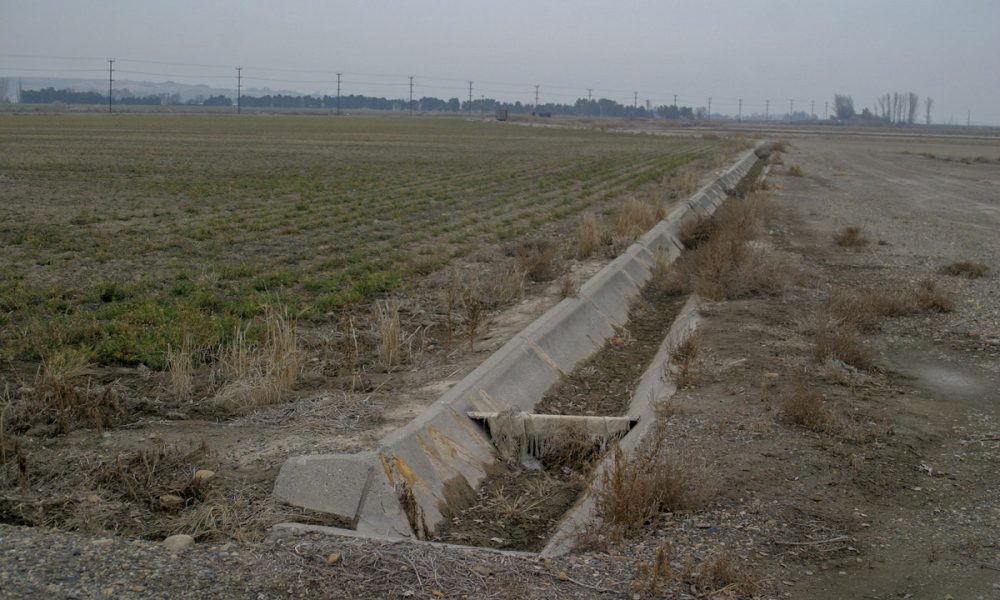
This is the proposed location outside of Nyssa for the Treasure Valley Reload Center. (The Enterprise/file)
NYSSA – Build it and they will come.
That appears to be the core theme behind the latest plot twist of a rail shipping center north of Nyssa, with Malheur County now scrambling to come up with more than $2 million to close a deal on a key piece of real estate.
The hunt for millions was triggered when the Oregon Transportation Department recently rejected Malheur County’s efforts to use state money to buy 366 acres of Nyssa land. State officials advised the Malheur County Economic Development Department six months ago of limits to land purchases, but county officials still pressed ahead.
Now, the county is facing a year-end deadline to buy 290 acres owned by the Farmer family along the Union Pacific tracks north of Nyssa. That ground was picked more than a year ago as the site for the Treasure Valley Reload Center.
“The property must be in hand for the project to move forward,” Greg Smith, Malheur County economic development director, wrote to state officials on Aug. 20.
According to county and state records, the Farmers want to close a sale by Dec. 31. At the moment, the county doesn’t have the money to do that.
[ You can keep local news going and strong – SUBSCRIBE ]
Smith now has turned to borrowed money to make the deal happen. This would be the first time the county has considered going into debt to make the development project work. Until recently, Smith has planned on the state footing the bill for extra real estate as part of the state’s $26 million commitment to the rail project.
In recent weeks, Malheur County prepared to sign a formal agreement with the state to unlock the $26 million. The Oregon Transportation Commission was scheduled to approve the deal this week.
Records obtained from state agencies showed that on Aug. 20, Smith and his team submitted detailed “milestones” to the Transportation Department, laying out where millions would be spent and over what time.
The document included $3.2 million for real estate. In a letter to the agency, Smith said Malheur County would use state money for the 290-acre Farmer property and a nearby 76-acre parcel owned by Nyssa Industries. Smith said that besides the shipping center, the land would provide for “several industrial lots for development” and “for future expansion and development.”
That all changed in a day.
When state officials insisted they wouldn’t pay for land not needed for the rail center, Smith’s team changed numbers, eventually agreeing that 65 acres was needed for the rail center and reducing the budget for the land to $700,000.
But rather than cut the project budget by $2.5 million to reflect the lower land costs, county officials on paper spent it elsewhere.
One day after listing construction costs at $18.5 million, Malheur County submitted a new budget that pumped up construction costs to $20.9 million.
The shift caught the attention of state officials, email records show.
Brad Baird, president of the engineering firm Anderson Perry & Associates that is working on the project, told the state that the overnight price increase reflected “several construction items” that “could end up costing more than anticipated.” He also said “construction costs are steadily rising.”
Baird didn’t respond to written questions seeking a more detailed explanation about the jump in construction costs.
“Budgets will continue to evolve,” Smith told the Enterprise Monday by email. “This is not incompetence. It is project management.”
Now, county officials hope to convince a second state agency – Business Oregon – to jump into the Nyssa project.
Last week county officials reached out to Business Oregon – the state economic development agency – to borrow $5 million to buy the Farmer property and put in water and sewer services.
The loan would come from the state’s Special Public Works Fund, an economic development coffer supported by lottery dollars, bond sales, loan repayments and earnings from interest.
County officials must acquire the Business Oregon loan fast to lock up the Farmer property.
“We wouldn’t have a mile of (rail) siding if we don’t have it,” said Larry Wilson, Malheur County commissioner.
Wilson said the county no longer intends to buy the Nyssa Industries property. A county agreement executed last year to buy that ground expired last month.
“It will just have to be determined later, if the money is there, to purchase Nyssa Industries,” said Wilson.
Wilson is a minor shareholder in Nyssa Industries.
While the county delivered preliminary paperwork for the loan to Business Oregon, county officials have not made a final decision on the proposal, said Wilson.
Wilson said the Malheur County Court must vote on the matter and the Malheur County Development Corp. – a public company created to oversee the rail center – will need to approve the proposal as well.
Smith outlined the state loan to the development company board last week, but said that was only one step that had to be completed immediately.
He also said an appraisal of the Farmer land is needed but that appraisers are booked three to five months out.
“We’re not going to be able to advance on several fronts without the appraisal,” Smith said.
Wilson said the Business Oregon loan “looks like a good option in the long run.”
According to the county’s preliminary application, the Farmer property “is part of a broader strategy to have developable industrial land including the reload site investment, infrastructure extension and the possibility of a regional significant industry site designation.”
Smith said in the submission that once the facility is built it would attract interest from other firms.
“We anticipate once the reload center begins construction, a number of associated and non-associated businesses will express interest and purchase land around the reload facility. This land, with amenities in place, will be highly marketable as water and sewer will make land ‘shovel ready,’ “ according to the state submission.
Such loans can benefit communities, said Chris Cummings, assistant director of economic development for Business Oregon.
“Our terms go longer than most bank loans and the interest rates are lower. What we are able to do is loan at the low market interest rate up to 30 years. We can loan funds only to public entities, the most common being a city or a county,” said Cummings.
Cummings said the Special Public Works Fund loaned about $90 million to “mostly rural communities between 2017 and 2019.”
The loan process can take “anywhere from a few weeks to a few months. It depends on the complexity of the project and how quickly the application provides all the data we need,” said Cummings.
Wilson said the county court slated a public meeting this Wednesday with Business Oregon representatives to review the loan proposal.
“Whether we will make the decision Wednesday or not depends on what we hear from Business Oregon and the development corporation,” Wilson said.
If the loan were made, the county would make annual payments to the state, said Nathan Buehler, marketing and communications manager for Business Oregon.
Smith didn’t respond to written questions about the shift to borrowed money and likely terms of such a state loan.
Smith told the development company board last week that the loan would be paid through income taxes on companies operating in the new industrial area.
“Before we ratify and go ahead with the formal application, we will know it is certain it is going forward,” said Wilson.
Smith also said last week that an “emergency” option if the state loan didn’t work out would be to instead borrow $5 million from the Morrow Development Corp., a public development lending operation affiliated with the Port of Morrow. Smith’s company is under contract to that operation and he said he is Morrow Development’s “officer of the board.”
However, Smith told the Enterprise via email Monday that the Morrow Development Corp. “has elected to not participate.”
The rail project faced intense state scrutiny in January when its operating plan, including the source for badly needed rail cars, was questioned by state officials and their consultants.
Timelines for the project also slipped. Smith projected last year that crew would be breaking ground this spring but that didn’t happen as the Oregon Transportation Commission requested more details. That stalled the approval of the reload center until July, and now Smith projects onions won’t ship out of Nyssa for another three years.
News tip? Reporter Pat Caldwell: [email protected] or 541-473-3377.
CORRECTION: Business Oregon said it provided the wrong information on the repayment schedule. The county must make an annual, not a monthly, payment to pay off the state loan.




